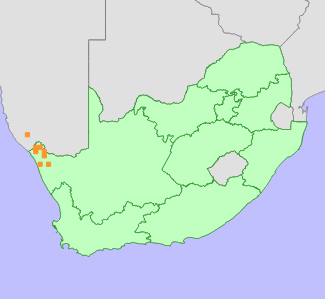|
Scientific Name | Diascia nodosa K.E.Steiner |
Higher Classification | Dicotyledons |
Family | SCROPHULARIACEAE |
National Status |
Status and Criteria | Vulnerable B1ab(iii,v) |
Assessment Date | 2015/04/28 |
Assessor(s) | L. von Staden |
Justification | A range-restricted species (EOO 3857 km²), known from fewer than 10 locations in South Africa where it is declining due to severe overgrazing across its range. |
Distribution |
Endemism | Not endemic to South Africa |
Provincial distribution | Northern Cape |
Range | Southern Namibia to Steinkopf. |
Habitat and Ecology |
Major system | Terrestrial |
Major habitats | Namaqualand Strandveld, Northern Richtersveld Scorpionstailveld, Upper Annisvlakte Succulent Shrubland, Southern Richtersveld Scorpionstailveld, Central Richtersveld Mountain Shrubland, Western Gariep Hills Desert, Kahams Mountain Desert |
Description | Sandy soils on lower, cool south-facing slopes, or in dry, sandy streambeds, often in the shade of larger shrubs. |
Threats |
| This species is threatened across its range by severe overgrazing due to overstocking of livestock. Not only are all palatable species grazed to the ground, the area is also continually degraded due to trampling and a loss of vegetation cover, causing erosion, loss of topsoil, and a hotter, drier soil surface that it unsuitable to most sensitive species dependent on the shading and cooling effect of larger nurse-plants. |
Population |
This species was formerly recorded as abundant on drainage lines just below the top of Helskloof Pass (Steiner 1992), but on a recent visit, even after exceptionally good rainfall, no plants could be found. On the coastal plains between Lekkersing and Sendelingsdrif it is also declining due to very severe overgrazing. It is easily overlooked, and may only emerge in years of good rainfall, but is becoming rarer across its limited range within the Richtersveld. It was recently recorded in southern Namibia, where it is known from one locality in diamond mining areas. These areas are botanically poorly explored, and it is possible that other subpopulations may exist.
|
Population trend | Decreasing |
Assessment History |
Taxon assessed |
Status and Criteria |
Citation/Red List version | | Diascia nodosa K.E.Steiner | VU B1ab(iii,v) | 2015.1 | | Diascia nodosa K.E.Steiner | Least Concern | Raimondo et al. (2009) | |
Bibliography |
Raimondo, D., von Staden, L., Foden, W., Victor, J.E., Helme, N.A., Turner, R.C., Kamundi, D.A. and Manyama, P.A. 2009. Red List of South African Plants. Strelitzia 25. South African National Biodiversity Institute, Pretoria.
Snijman, D.A. 2013. Plants of the Greater Cape Floristic Region 2: The extra Cape flora. Strelitzia 30. South African National Biodiversity Institute, Pretoria.
Steiner, K.E. 1992. A new Diascia species (Scrophulariaceae) from the Richtersveld, South Africa. South African Journal of Botany 58(1):36-38.
|
Citation |
| von Staden, L. 2015. Diascia nodosa K.E.Steiner. National Assessment: Red List of South African Plants version 2024.1. Accessed on 2026/02/13 |
 Comment on this assessment
Comment on this assessment


